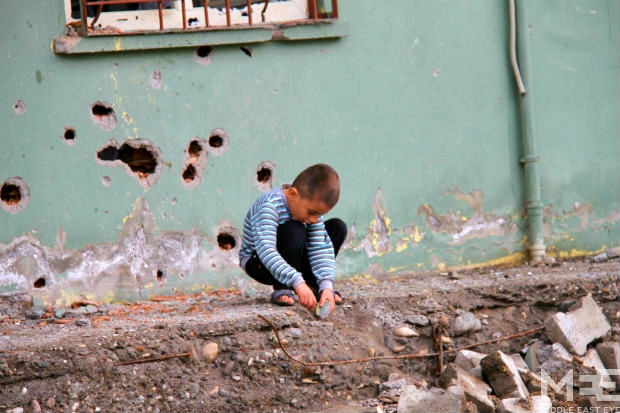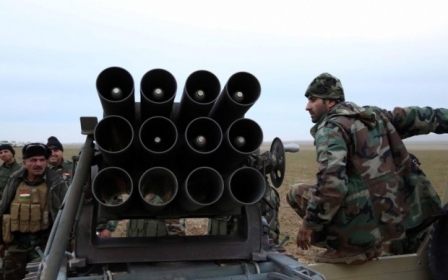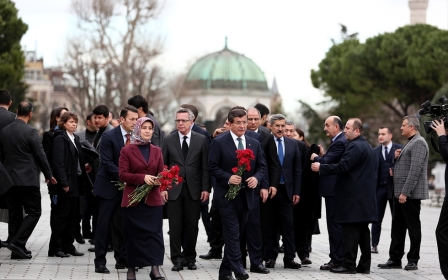'I hope no one suffers like us': Residents return to shattered Turkish town

By Mahmut Bozarslan
The blanket curfew in Silopi lasted 36 days as clashes raged between the Turkish army and the Kurdistan Workers Party (PKK). Finally it was lifted, allowing residents to come to terms with the scale of the destruction in their hometown.
The curfew in Silopi, a town of some 80,000 in the Kurdish-dominated Sirnak province of southeastern Turkey, was one of several imposed as the army wages a relentless campaign to crush the PKK.
The government says the measures are essential to oust PKK which had gained control of key urban centres in southeastern Turkey. Kurdish groups, by contrast, accuse the army of killing dozens of civilians.
Silopi's curfew remains in place between 6pm and 5am. But as authorities lifted it from Monday during daytime hours, residents who were forced out returned to confront the ruins.
With tears in her eyes, Feyruze Buluttekin lamented the piteous state of her home. Its balcony has collapsed in several places, its windows are smashed and its floor has been ripped apart, possibly by a shell.
"We stayed at our house. Some left, some didn't. We stayed for 12 days," Buluttekin said.
"On the 13th day, my cousin was killed in front of her house. Her body stayed at our home for five days, with no one else taking care of it, and then we took it to the mosque.
"On the 15th day, the soldiers stormed our neighbourhood and forced us out of our house and took us to a sports centre."
'Covered children's ears'
The military operation, backed by the curfew, began on 14 December, when special forces and the army entered Silopi in force with the avowed aim of removing barricades and filling in trenches set up by the militants.
Clashes raged day and night in a battle that turned the town into a warzone, with the army using tanks and heavy artillery against rockets and improvised bombs used by the militants.
"We couldn't even get water because we were afraid of the sounds of rockets and weapons. We suffered a lot," said Mehmet Simsek, who stayed in his house for 14 days.
"We have 10 children and we covered their ears with cotton swabs, fearing their ears would explode. Then (after 14 days) soldiers forced us out of our house."
He added: "I hope no one suffers like us."
The house of the Mutlu family suffered some of the most damage in the town, lying in ruins, presumably after being hit by a missile or a bomb.
"I don't know who attacked us!" said the mother of the family, Sariye, lamenting that their only cow, a crucial source of food, had been killed.
'Okay, kill me'
According to the army, 136 "terrorists" have been killed in the operation in Silopi, dealing a considerable blow to the PKK.
It says another 352 militants have been killed in an ongoing operation in the town of Cizre, also in Sirnak, that started on 14 December, and 103 in the Sur district of Diyarbakir city in an operation that started on 2 December.
The opposition pro-Kurdish Peoples' Democratic Party (HDP) ridicules that toll and says that at least 70 civilians have been killed in the operations.
Many residents blame the army for the extent of the damage. But others also point a finger at the PKK and in particular its youth branch the Patriotic Revolutionist Youth Movement (YDG-H), which is active in urban areas.
"They were breaking people's doors but I told them not to do that, saying people will eventually return," said Hamit Alkis.
"They pointed a gun at my chest and threatened to kill me. I said: 'Okay, kill me'. The soldiers came and just as we were walking towards the soldiers, they opened fire on us from behind, thankfully it didn't hit."
On a visit to London on Monday, Prime Minister Ahmet Davutoglu said that the operations in Silopi were largely finished, with the "trenches filled in and barricades dismantled".
But even after the partial lifting of the curfew, there is still a heavy security presence in the town. Armoured vehicles still stream in, even as others leave.
Operations continue in some neighbourhoods and only a few businesses have reopened. And those reopened are trying to repair the damage done.
Middle East Eye propose une couverture et une analyse indépendantes et incomparables du Moyen-Orient, de l’Afrique du Nord et d’autres régions du monde. Pour en savoir plus sur la reprise de ce contenu et les frais qui s’appliquent, veuillez remplir ce formulaire [en anglais]. Pour en savoir plus sur MEE, cliquez ici [en anglais].




